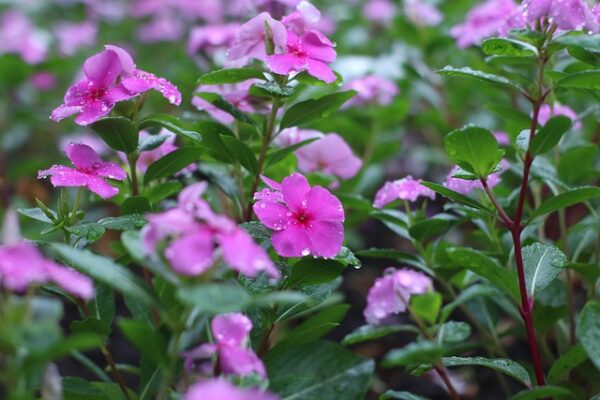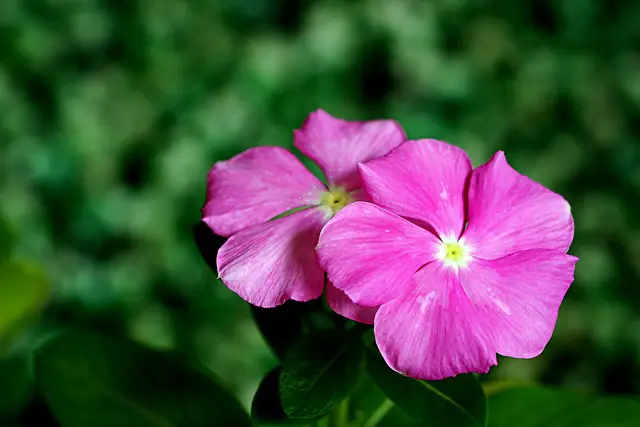Feel free to share!
Table of Contents 👈 Tap Here
The Madagascar periwinkle (Catharanthus roseus) is a vibrant, low-maintenance plant that thrives with minimal effort, making it an ideal choice for both new and experienced gardeners. Known for its long-lasting blooms and remarkable adaptability, Madagascar periwinkle brings a splash of colour to pots, garden beds, and borders alike.
Few flowering plants offer such a perfect mix of toughness and charm. With soft, five-petalled flowers in pinks, whites, and purples, this tropical gem doesn’t just beautify—it endures. Heat, drought, and even a bit of neglect don’t stop the Madagascar periwinkle from putting on a show. But to truly unlock its potential, the right care matters. In this comprehensive guide, we’ll walk you through 20 powerful tips to keep your periwinkle thriving—from smart watering strategies to seasonal protection. Get ready to transform your growing space with this cheerful and easygoing bloomer.

🌞 1. Choose a Sunny Spot for Maximum Blooming
Madagascar periwinkle thrives best in full sunlight. Pick a spot that gets at least 6 to 8 hours of direct sunlight per day. Adequate sunlight ensures strong stems, rich leaf colour, and an abundance of vibrant flowers throughout the growing season, especially in tropical and subtropical regions where the plant naturally flourishes.
Tip: If grown indoors, place your plant near a bright, south-facing window.
🌱 2. Utilise Soil That Drains Well to Avoid Root Rot.
Soggy soil greatly affects the plant’s roots. Always use loose, sandy, or loamy soil that drains quickly. Poor drainage can lead to fungal infections and root rot, which often cause irreversible damage. A good mix includes potting soil, sand, and perlite for container plants.
Tip: Avoid clay soil unless it’s heavily amended with compost and sand.
💧 3. Water Deeply, But Less Frequently
This plant is drought-tolerant, meaning it can survive short dry spells. Water thoroughly only when the top inch of soil feels dry to the touch. Frequent light watering promotes shallow roots, while deep watering encourages a stronger root system and better resistance to heat.
Tip: Before you water again, inspect the topsoil with your finger.
🌼 4. Fertilise Monthly for More Blooms
Madagascar periwinkle doesn’t demand heavy feeding, but a monthly dose of balanced liquid fertiliser encourages lush foliage and continuous blooming. For best results, choose a formula that supports flowering and avoids excess nitrogen, which leads to green growth with fewer flowers.
Tip: Use a bloom booster every six weeks during the summer.
🌡 5. Maintain Warm Temperatures Year-Round
This tropical plant enjoys heat and sulks in the cold. Temperatures between 20°C and 30°C (68°F and 86°F) are ideal for it. If temperatures drop below 15°C (59°F), growth slows down, and cold injury may occur. It’s a perennial in warm zones but grown as an annual in colder areas.
Tip: Bring potted plants indoors during chilly nights or use garden fleece.
✂️ 6. Prune Regularly to Keep It Bushy
Regular trimming encourages denser growth, enhances air circulation, and lessens legginess. Additionally, it helps refocus energy towards new flowers and keeps the plant compact. A neat form is maintained, and new branches are encouraged to grow with light trimming every few weeks.
Tip: To prevent the spread of disease, prune with sharp, clean scissors.
🪻 7. Deadhead Spent Blooms to Prolong Flowering
When you remove old, fading flowers, the plant uses its energy to produce new blooms instead of forming seeds. Deadheading also keeps the plant visually fresh and tidy. You’ll notice increased flower production when you stay consistent with this simple maintenance step.
Tip: Pinch off wilted flowers just above a leaf node.
🐛 8. Early Control of Pests Like Mealybugs and Aphids
Madagascar periwinkle is relatively pest-resistant, but sap-sucking insects like aphids and mealybugs may occasionally appear. These pests have the ability to transmit diseases and weaken plants. Regularly inspect leaves and treat infestations early with neem oil or a gentle insecticidal soap spray.
Tip: Spray in the early morning or evening to avoid leaf burn.
🦠 9. Watch Out for Fungal Diseases
Overcrowding, wet foliage, or inadequate air circulation can all encourage fungal problems like leaf spot or powdery mildew. Water at the soil level, never above, and take out any yellowing or spotted leaves as soon as possible. Healthy growth requires proper hygiene.
Tip: Plants should be spaced 12 to 18 inches apart to improve airflow.
🪴 10. Repot Every Year for Healthy Growth
In pots, Madagascar periwinkle benefits from fresh soil and extra room every growing season. Repotting once a year in spring prevents root binding and allows better nutrient uptake. You’ll also get more flowers and faster growth with fresh soil.
Tip: Choose a pot just 1–2 inches larger than the old one.
✂️ 11. Start from Cuttings for Quick Propagation
Stem cuttings root easily and give you exact clones of the parent plant. Choose non-flowering stems, remove lower leaves, and root in moist potting mix or water. Within weeks, new roots will form, making it easy to grow more plants.
Tip: For quicker results, dip the cut end into rooting hormone.
🍂 12. Use Mulch to Retain Moisture
Adding organic mulch around the base of your plant retains moisture, reduces weed growth, and keeps roots cool. Especially in hot, dry climates, mulch acts as a natural insulator and protects the soil from rapid drying.
Tip: Keep mulch at least 2 inches away from the stem base.
🔄 13. Rotate Potted Plants for Even Growth
If you’re growing Madagascar periwinkle in containers, make it a habit to rotate the pot weekly. This ensures even light exposure and prevents lopsided or leggy growth on one side of the plant.
Tip: Use a lazy Susan turntable indoors to rotate with ease.
🪴 14. Grow as Ground Cover in Warm Climates
Madagascar periwinkle spreads quickly and is ideal for covering bare patches in warm-climate gardens. Its dense foliage crowds out weeds, and continuous blooms provide season-long colour.
Tip: Plant at 12-inch spacing to allow enough room for spreading growth.
⚠️ 15. Avoid Overfeeding Nitrogen
While fertilising helps, too much nitrogen results in large green leaves and very few flowers. Stick with a balanced or bloom-focused fertiliser and avoid over-application, especially in rich soil.
Tip: Choose fertilisers where the middle number (phosphorus) is higher than nitrogen.
🌿 16. Pinch Tips in Early Growth Stage
When your periwinkle is young, it will branch out if you pinch the top inch of growth. As a result, the plant becomes fuller and more compact, eventually producing more blooms.
Tip: Clip above a leaf node using sterile scissors or pinch with your fingertips.
🧊 17. Never Let It Freeze
Cold is one of the biggest threats to Madagascar periwinkle. It is extremely sensitive to frost and will not survive freezing temperatures. If you live in a colder region, always grow it as an annual or bring it indoors.
Tip: Cover garden beds with frost cloth during sudden cold snaps.
🧺 18. Refresh Soil Every 6 Months
Over time, nutrients deplete and soil becomes compacted. Replace the top 2 inches of soil in pots or lightly amend garden beds twice a year to ensure the plant continues to thrive with access to essential minerals.
Tip: Mix in compost or worm castings for a gentle nutrient boost.
🌸 19. Combine with Companion Plants
Pairing periwinkle with other sun-loving plants like marigold, petunia, or salvia improves the garden’s visual appeal and may help deter common pests. Just ensure companions have similar care requirements.
Tip: Avoid pairing with heavy water-loving plants like ferns or caladiums.
🌱 20. Start from Seeds for Variety
While slower, growing from seed offers the chance to try new colours and hybrids. Sow seeds indoors 8–10 weeks before the last frost date, keep them warm and moist, and transplant when they’re a few inches tall.
Tip: Use a seedling heat mat to speed up germination.
🌟 Final Thoughts
Madagascar periwinkle care is simple but powerful when done right. With these 20 methods, you’ll enjoy lush green growth and constant blooms for months. It’s a plant that pays you back generously when treated with consistency, warmth, and just the right touch of care.
Tip: Track watering, pruning, and blooming in a gardento master care over time.
